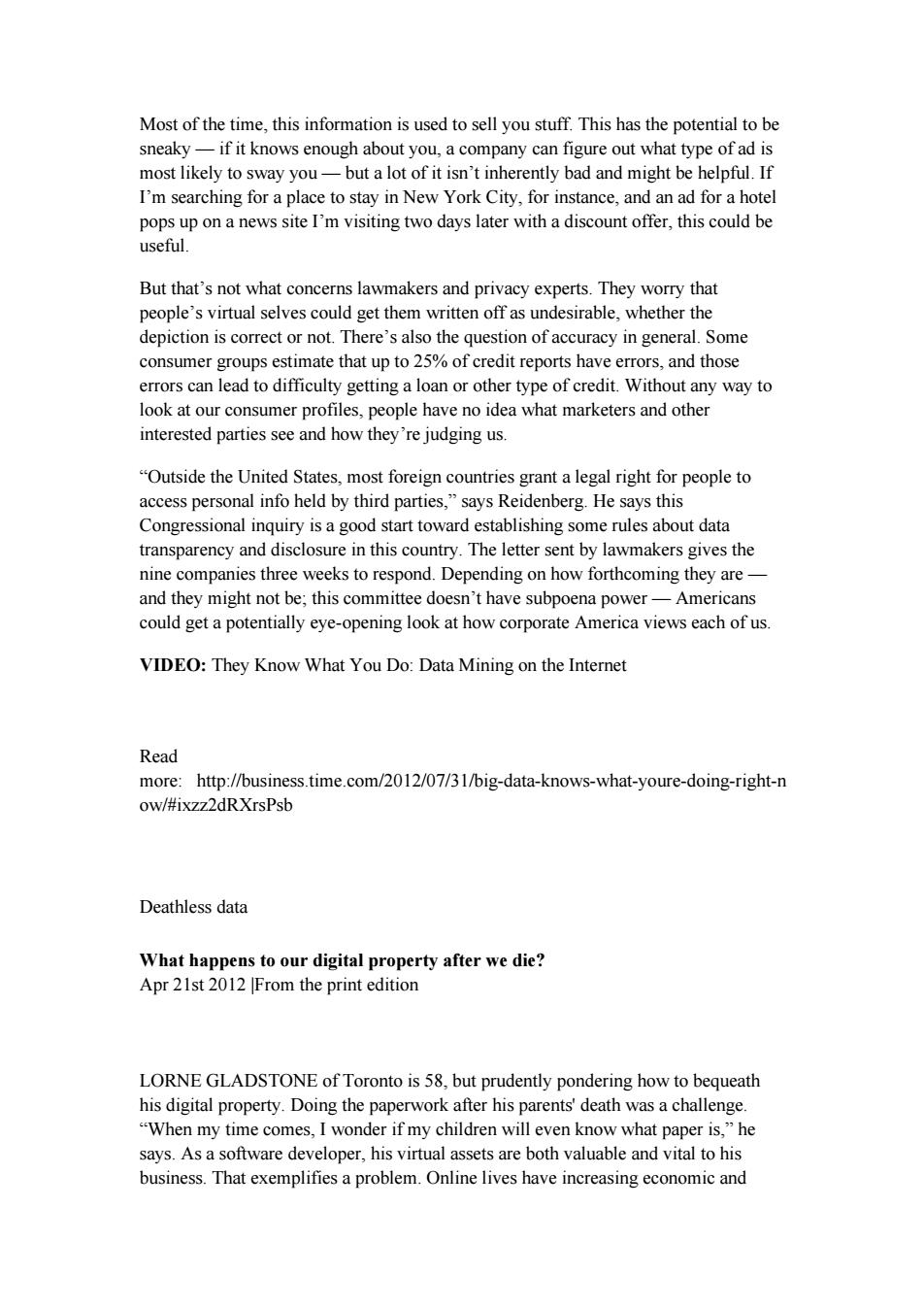正在加载图片...

Most of the time,this information is used to sell you stuff.This has the potential to be sneaky-if it knows enough about you,a company can figure out what type of ad is most likely to sway you-but a lot of it isn't inherently bad and might be helpful.If I'm searching for a place to stay in New York City,for instance,and an ad for a hotel pops up on a news site I'm visiting two days later with a discount offer,this could be useful. But that's not what concerns lawmakers and privacy experts.They worry that people's virtual selves could get them written off as undesirable,whether the depiction is correct or not.There's also the question of accuracy in general.Some consumer groups estimate that up to 25%of credit reports have errors,and those errors can lead to difficulty getting a loan or other type of credit.Without any way to look at our consumer profiles,people have no idea what marketers and other interested parties see and how they're judging us. "Outside the United States,most foreign countries grant a legal right for people to access personal info held by third parties,"says Reidenberg.He says this Congressional inquiry is a good start toward establishing some rules about data transparency and disclosure in this country.The letter sent by lawmakers gives the nine companies three weeks to respond.Depending on how forthcoming they are- and they might not be;this committee doesn't have subpoena power-Americans could get a potentially eye-opening look at how corporate America views each of us. VIDEO:They Know What You Do:Data Mining on the Internet Read more:http://business.time.com/2012/07/31/big-data-knows-what-youre-doing-right-n ow/#ixzz2dRXrsPsb Deathless data What happens to our digital property after we die? Apr 21st 2012 |From the print edition LORNE GLADSTONE of Toronto is 58,but prudently pondering how to bequeath his digital property.Doing the paperwork after his parents'death was a challenge. "When my time comes,I wonder if my children will even know what paper is,"he says.As a software developer,his virtual assets are both valuable and vital to his business.That exemplifies a problem.Online lives have increasing economic andMost of the time, this information is used to sell you stuff. This has the potential to be sneaky — if it knows enough about you, a company can figure out what type of ad is most likely to sway you — but a lot of it isn’t inherently bad and might be helpful. If I’m searching for a place to stay in New York City, for instance, and an ad for a hotel pops up on a news site I’m visiting two days later with a discount offer, this could be useful. But that’s not what concerns lawmakers and privacy experts. They worry that people’s virtual selves could get them written off as undesirable, whether the depiction is correct or not. There’s also the question of accuracy in general. Some consumer groups estimate that up to 25% of credit reports have errors, and those errors can lead to difficulty getting a loan or other type of credit. Without any way to look at our consumer profiles, people have no idea what marketers and other interested parties see and how they’re judging us. “Outside the United States, most foreign countries grant a legal right for people to access personal info held by third parties,” says Reidenberg. He says this Congressional inquiry is a good start toward establishing some rules about data transparency and disclosure in this country. The letter sent by lawmakers gives the nine companies three weeks to respond. Depending on how forthcoming they are — and they might not be; this committee doesn’t have subpoena power — Americans could get a potentially eye-opening look at how corporate America views each of us. VIDEO: They Know What You Do: Data Mining on the Internet Read more: http://business.time.com/2012/07/31/big-data-knows-what-youre-doing-right-n ow/#ixzz2dRXrsPsb Deathless data What happens to our digital property after we die? Apr 21st 2012 |From the print edition LORNE GLADSTONE of Toronto is 58, but prudently pondering how to bequeath his digital property. Doing the paperwork after his parents' death was a challenge. “When my time comes, I wonder if my children will even know what paper is,” he says. As a software developer, his virtual assets are both valuable and vital to his business. That exemplifies a problem. Online lives have increasing economic and